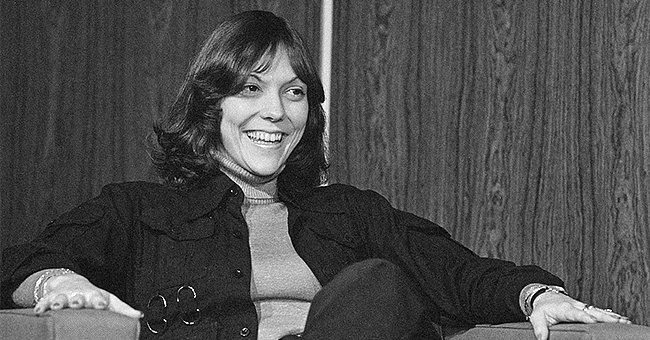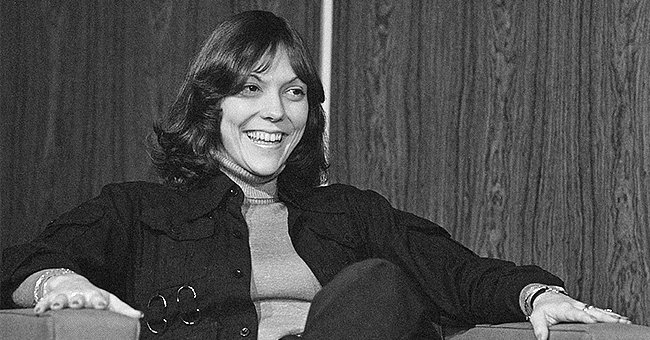
Karen Carpenter Would Have Been 72 Today — She Was the First Star Known to Have Died from Anorexia
Karen Carpenter had an angelic voice that sang several hits still listened to by today's generation. However, behind the beautiful performances on stage was a woman who suffered from anorexia nervosa and later died from the condition.
The iconic band, The Carpenters, is a name etched in the music industry for reaching worldwide fame. Karen Carpenter and Richard Carpenter graced the stage several times and sold over 100 million in the '70s, becoming one of the most successful siblings in the world.
Karen was known for her smooth and angelic voice that charmed the audience, but behind an incredible talent was a woman who struggled with a then uncommon eating disorder and craved for her mother's love and care, which she sadly never received; not even until her last breath.

Karen Carpenter smiles during an interview. | Source: Getty Images
A CHUBBY TEENAGER
Karen grew up as a chubby teenager, standing at 5" 4 and weighing 145 pounds. She worked for a slimmer figure and reached 120 pounds, in the best shape possible. At that time, the singer was already going on tours and found difficulty eating consistently. She once said:
"When you're on the road, it's hard to eat. Period. On top of that, it's tough to eat well. We don't like to eat before a show because I can't stand singing with a full stomach."
Given their concerts would end late, dinner would be at midnight, and for Karen, going to sleep feeling full was a challenge. "You're going to be a balloon," she added. Still, after disliking her unflattering outfit in pictures, Karen was determined to shed more pounds.

Richard and Karen Carpenter. | Source: Getty Images
DETERMINED TO LOSE WEIGHT
Karen decided to hire a personal trainer to shed a few more pounds. However, her trainer's new program caused her to bulk up. So, she fired her trainer and vowed she would do something about her figure.
What started as a goal to lose weight became a catalyst for extreme dieting, driving Karen to deceive the people around her that she was eating when she was not. In his book, "Little Girl Blue," Randy Schmidt revealed the root of Karen's eating disorder -- her mother's inability to express love and affection.
The iconic singer shed 20lbs more, which gained her compliments from her then boyfriend's sister, Carol Curb. "She lost around 20lbs, and she looked fabulous," Curb recalled. "She weighed 110lb or so and looked amazing. If she'd been able to stop there, then life would have been beautiful."

Richard and Karen Carpenter. | Source: Getty Images
A CASE OF EXTREME DIETING
Losing weight became more than just a goal to Karen; it became an addiction. During meals, Karen devised a tactic to deceive her family and friends that she was eating when, in fact, she was consuming nothing.
Following her death, a group of medical professionals focused on treating eating disorders requested the Food and Drug Administration to ban over-the-counter sales for medicines that induced vomiting.
She would cut the food on her plate and push it around before giving some to her friends to try. Before everyone knew it, her plate was empty, but so was her stomach. By the time she was 90 pounds, Karen had devised a way to hide her extreme weight loss.
HIDING HER BODY
The "Yesterday" songstress hid behind several layers of clothing to avoid comments from people telling her to eat more. Her agent, Sherwin Bash, revealed:
"She would start with a long-sleeved shirt and then put a blouse over that, and a sweater over that and a jacket over that. With all of it, you had no idea of what she had become."
Bash was horrified to see Karen's bones protruding through her clothing during a stage performance. Fans were just as shocked and gasped once they saw Karen's figure. Some of them thought their beloved singer had cancer.
BEHIND HER ANOREXIA
While it seemed like the solution was simple – just eat – the underlying problem behind Karen's anorexia nervosa was far more challenging to solve. She lacked maternal love, which she longed for. In 1975, Karen was admitted to the hospital after two years of extreme dieting.
She was mentally and physically exhausted, catching her mother, Agnes' attention. Agnes watched her daughter, who slept for over 14 hours a day. At one point, Karen's weight went up to 104 pounds, but her body was depleted. She still suffered from anorexia and bulimia nervosa for the next few years.
In 1976, after two months under her parents' watch, Karen moved into her own apartment. Four years later, she met a man that could have changed her life, Tom Burris, a 39-year-old divorcee. They fell in love, and two months later, they were engaged.
LIFE WITH TOM
Karen's dream of having a family was finally within reach, but she discovered her lover's secret and fell apart. Tom had a vasectomy and neglected to disclose it with her, despite knowing she wanted children.
Devastated, Karen decided to call off the wedding, but Agnes did not allow it, seeing as it would hurt her image. The marriage was nothing short of a disaster. Burris, who seemed wealthy with material possessions, was, in reality, living over and beyond his means.
He spent Karen's money and mistreated her, even calling her a "bag of bones" at one point. "Karen was dealing with her anorexia and her career. I was dealing with my real estate problems," he said. "I feel totally guilty like I'd like to reverse everything." In 1981, Karen filed for divorce.
MEETING DR. LEVENKRON
Shortly after, Karen sought help from Steven Levenkron, a psychotherapist who wrote a book on eating disorders and admitted to taking 80 to 90 tablets of laxatives a night and using thyroid medication to speed up her metabolism, despite having a healthy thyroid.
A few months in, Levenkron called in Karen's parents and brother to gather for a session, helping Karen by telling her they loved the singer. Richard professed his love with ease, yet Agnes, whose love Karen needed most, responded differently. She said:
"Well, I'm from the north, and we just don't do things that way."
THE TRUTH ABOUT KAREN'S FAMILY
According to Pat Boone's daughter, Cherry O'Neil, she once spoke to Karen over the phone. "She didn't sound panicked, but she felt that she really needed some help," O'Neil said. She added:
"Karen was having particular problems with laxatives. She could not believe she could ever get to a point where she was not dependent on them."
A longtime friend of the singer revealed that Karen grew up in a controlled environment, with her parents making significant decisions.

Karen Carpenter on stage, London. | Source: Getty Images
DEPLETED AT 32
Karen went downhill with her unusual heartbeat that resulted in hospitalization from dehydration. She was fed through a tube that allowed her to gain weight, and with a thoughtful recovery, she showed everyone she started helping herself.
On Friday morning, Agnes found her daughter lying on the floor, face down, dead. She was physically and emotionally depleted, having battled anorexia for years. Karen collapsed in her walk-in closet, clotheless, with her nightgown over her body.
Agnes, grief-stricken, was escorted from the room. Paramedic Bob Gillis said that Karen had a good chance of surviving, but she went into cardiac arrest. On her final days, she abused a vomit-inducing medicine called Ipecac that caused her heart muscles to dissolve, leading to her demise.
KAREN'S IMPACT ON THE STIGMA
Following her death, a group of medical professionals focused on treating eating disorders requested the Food and Drug Administration to ban over-the-counter sales for medicines that induced vomiting.
According to Karen's therapist, tens of thousands of Americans abused Ipecac in hopes of losing weight. Ipecac is a "drug that was not known until very recently as an abusive drug."
As the first star known to have passed away from anorexia, Karen's death struck many around the globe. Eating disorders are more common nowadays and known in the medical field. Previously, another known figure, Odalis Santos Mena, passed away from the same condition.
The information in this article is not intended or implied to be a substitute for professional medical advice, diagnosis or treatment. All content, including text, and images contained on news.AmoMama.com, or available through news.AmoMama.com is for general information purposes only. news.AmoMama.com does not take responsibility for any action taken as a result of reading this article. Before undertaking any course of treatment please consult with your healthcare provider.
